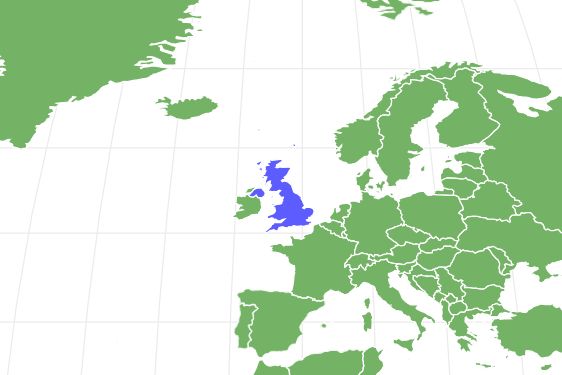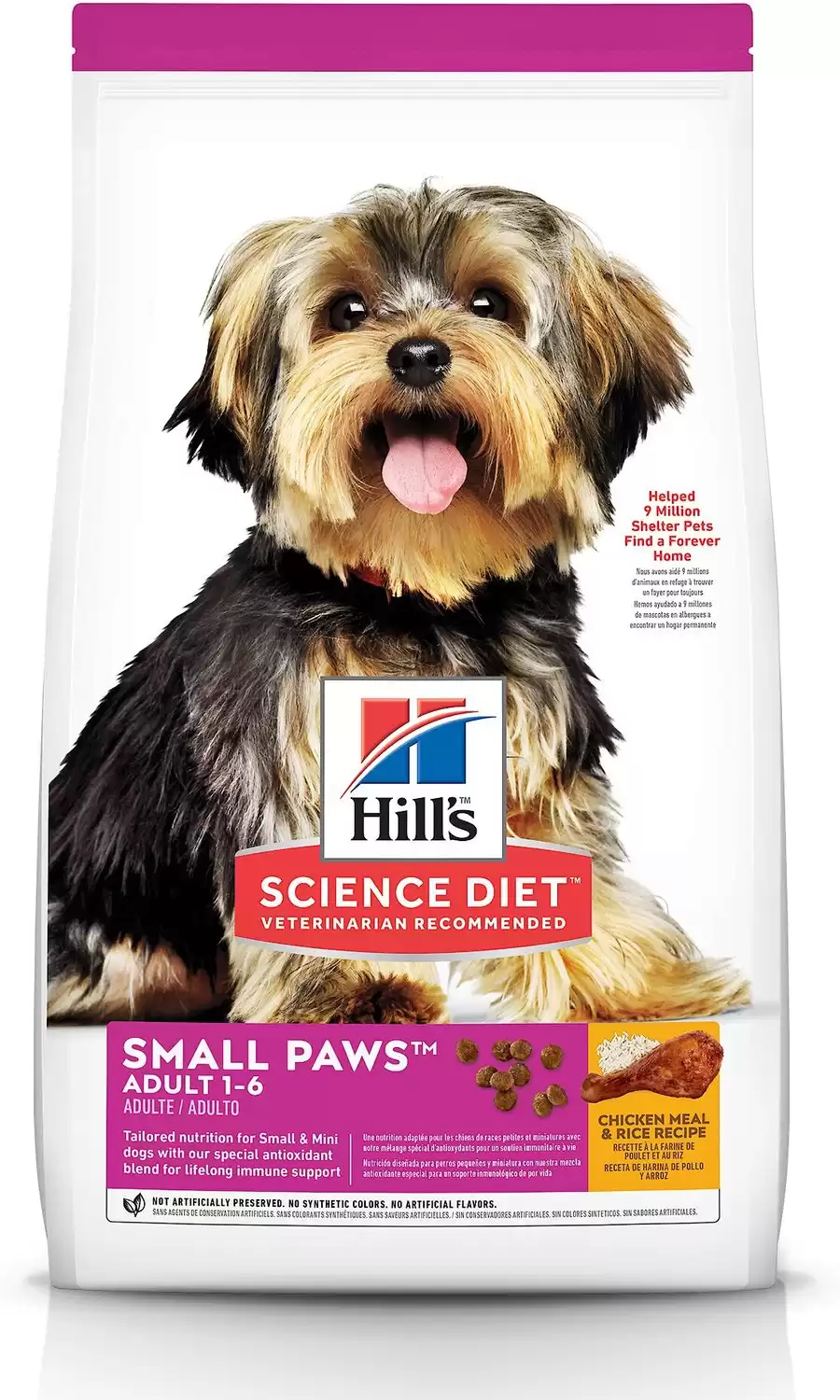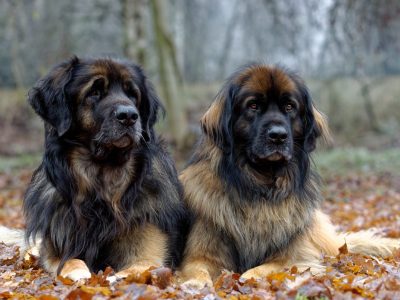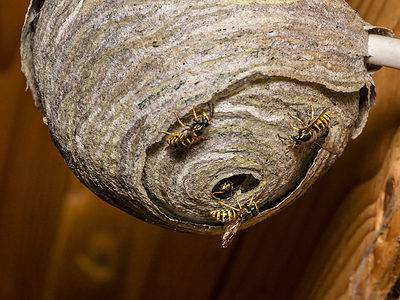Yorkshire Terrier
Canis lupus
Yorkies hold many records for smallest dog.
Advertisement
Yorkshire Terrier Scientific Classification
- Kingdom
- Animalia
- Phylum
- Chordata
- Class
- Mammalia
- Order
- Carnivora
- Family
- Canidae
- Genus
- Canis
- Scientific Name
- Canis lupus
Read our Complete Guide to Classification of Animals.
Yorkshire Terrier Conservation Status
Yorkshire Terrier Facts
- Fun Fact
- Yorkies hold many records for smallest dog.
- Temperament
- Lively, playful and affection-seeking
- Diet
- Omnivore
Yorkshire Terrier as a Pet:
- General Health
- Energy Level
- Shedability
- Trainability
- Intelligence
- Tendency to Chew
- Size
- Family and kid friendliness
- Yappiness / Barking
- High
- Hypoallergenic
- Yes
- Separation Anxiety
- High
- Preferred Temperature
- Average climate
- Exercise Needs
- Moderate
- Friendly With Other Dogs
- High
- Pure bred cost to own
- $1000-$2000
- Dog group
- Terrier
- Male weight
- 3-7 lbs
- Female weight
- 3-7 lbs
This post may contain affiliate links to our partners like Chewy, Amazon, and others. Purchasing through these helps us further the A-Z Animals mission to educate about the world's species.
View all of the Yorkshire Terrier images!
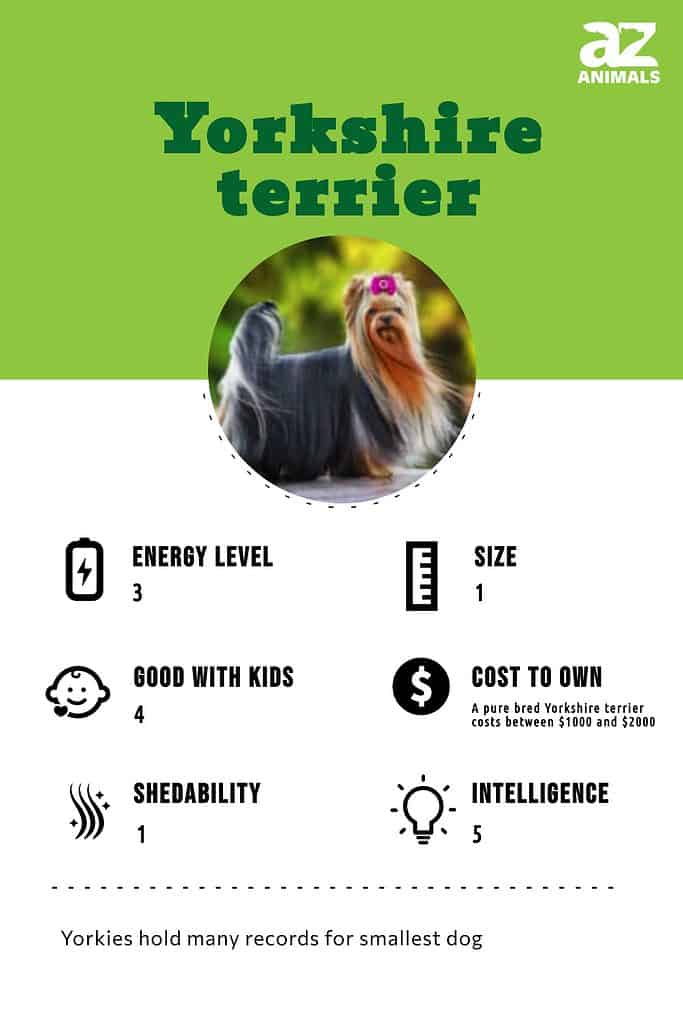
The Yorkshire Terrier, a.k.a. the Yorkie, is the epitome of the toy-size canine. It’s a dainty thing, typically growing to no more than seven pounds and no more than nine inches at the shoulder.
Though the teacup pup’s considered a purebred, his origin is from cross-breeding. He’s a mix from breeders crossing the Clydesdale terrier and the now-extinct Paisley terrier.
See all of our expert product reviews.
The Yorkie may be small, but it’s feisty, tenacious, brave and as pushy as a poo gets. They’re pretty bold and are a popular breed across the country in both big cities and with urbanites.
The Yorkie has all the characteristics of a terrier. The Yorkie is long-lived and loves being a companion. He’s unique, makes a great little watchdog and will definitely keep you entertained!
Yorkie puppies and adult dogs have different coloring. They’re born tan and black. Over the years, their coat turns blue before the tan goes richer into an almost gold shade.
Evolution and Origins
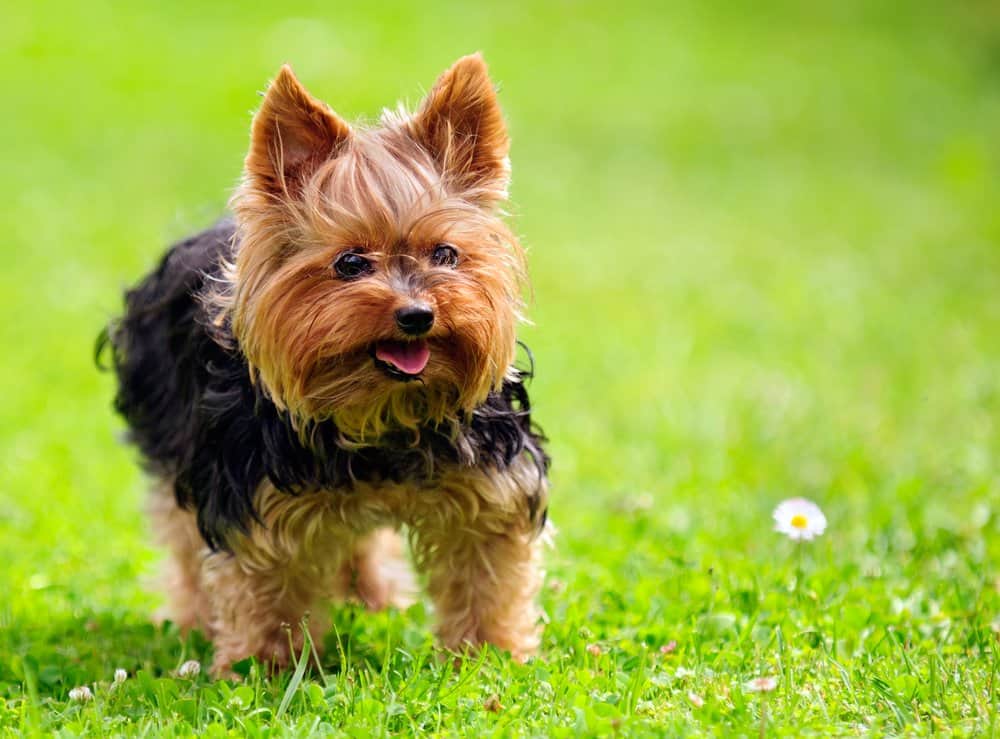
The origins of the breed can be seen from its name; these small dogs were bred by Scottish immigrants to Yorkshire during the Industrial Revolution
©Imageman/Shutterstock.com
Health and Entertainment for your Yorkshire Terrier
See all of our expert product reviews.
The Yorkshire terrier has its origins, just as the name suggests, in the Yorkshire county of England.
This breed of dog evolved alongside the industrial revolution in England in the 1800s. This period
saw the migration of Scottish workers in search of jobs in mines and textile mills. These migrant
workers brought along with them a variety of petite terrier dogs known as Scottish terriers. The
breeding of these different miniature terriers such as the Paisley, Skye, Clydesdale brought about the
creation of the Yorkshire terrier. The breed was first known as the Broken haired terrier and later
called the toy terrier and at last was named the Yorkshire terrier bin 1874.
Yorkshire terriers evolved over time from being ratters and hunting dogs to being luxury pets. The
Yorkshire terrier was initially bred to exterminate rodents and other pests that hid in crevices and
holes of the mines and textile mills. They advanced to hunting small animals that lived in burrows
and cracks of rocks in the forest which made the breed popular for its fearlessness in hunting down
prey.
The popularity of the Yorkshire terrier grew so that the breed was no longer confined to the mines
and forests as work dogs but was brought into homes as pets. Its popularity rose as a result of its
peculiarly small statue and silk fur. its popularity grew so much amongst the English society and the
breed became recognized by the English Kennel Club in 1886 and the American Kennel Club in 1885.
Types of Yorkie Mixes
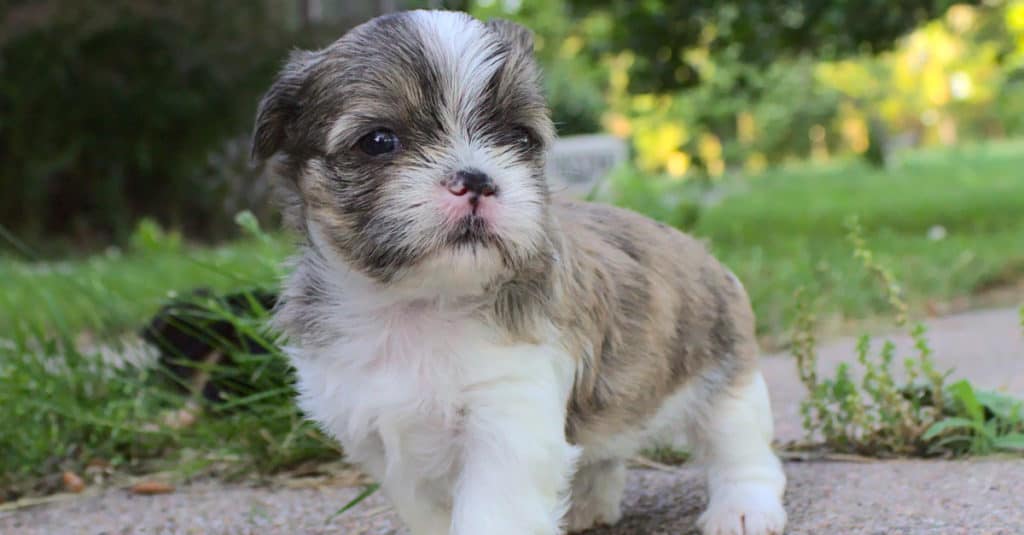
Torkies are just one of several Yorkshire terrier crossbreds available
©Plains Photography/Shutterstock.com
The record books only record the puppies we all know and love as the Yorkshire terrier. There are several breeds created from a mix.
There is the Biewer (pronounced beaver) terrier, a new breed borne from Yorkshire terriers. The Biewer Terrier is that charming dog with elegant long hair.
The Biewer is a rarity. A purebred created from the occurrence of a piebald gene in two Yorkshire terriers. You have the Mismarked terrier whose differentiation from the Yorkie is its unique coloring.
Breeders have done a lot with the Yorkie. Designer Yorkies include the Chorkie — a mix of a Yorkie and a Maltese. While teacup is associated with many types of dogs, the Teacup Yorkie, a purebred, is noted not so much for its size but its condition. Often, they are mini because of health issues.
Yorkshire terrier crossbreeds run the gamut. Some of these include:
- Corkie: A cross between a Yorkshire terrier and a cocker spaniel. It was originally bred to hunt woodcocks and vermin.
- Borkie: A cross between a Yorkshire terrier and a beagle, this breed is known for the strong attachment it forms with its owners. The first of them was born in the 1990s.
- Chorkie: A cross between a long- or short-haired chihuahua and a Yorkshire terrier. They tend to have the prominent eyes of the chihuahua parent as well as the feistiness of both parents.
- Dorkie: A cross between a dachshund and a Yorkshire terrier, it is extremely affectionate and capable of getting along with other furry companions.
- Havashire: A cross between a Havanese and a Yorkshire terrier, this breed is known for being intelligent and having a mind of its own.
- Griffonshire: A cross between a Brussels griffon and a Yorkshire terrier, it is renowned for its intelligence, sass, and affectionate nature.
- Pugshire: A cross between a pug and a Yorkshire terrier, this breed is very friendly with both friends and strangers alike. It is also often healthier than pugs in general which may suffer from poor health.
- Morkie: A cross between a Maltese and a Yorkshire terrier, this mix might resemble one parent more closely than the other. It is known for being somewhat naughty which belies its supremely cute appearance.
- Torkie: A cross between a toy fox terrier and a Yorkshire terrier, this tiny cuddly pooch is known for its protective nature and a tendency to snap when displeased.
- Snorkie: This cross between a Miniature Schnauzer and a Yorkshire Terrier is a highly intelligent and excellent guard dog, its miniature size notwithstanding.
- Yoranian: A Pomeranian, Yorkshire terrier mix, this adorably scruffy furball not only gets along with little children but is also pretty spunky.
Owning a Yorkshire Terrier: 3 pros and cons
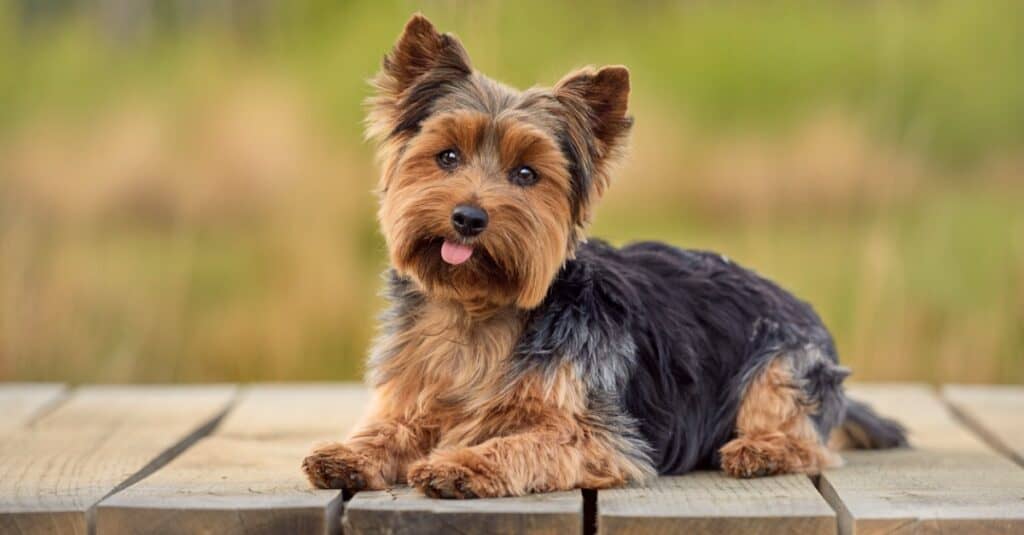
Despite being dainty, Yorkshire terriers are known for being feisty and bold.
©iStock.com/Kurt Pas
The Yorkie is constantly on the AKC’s top breeds lists. She’s a tiny package with a massive personality. Still, ownership doesn’t mean you’re golden. To balance things out, here are three pros and three cons linked to the dog.
| Pros! | Cons! |
|---|---|
| Sheds very lightly The lack of hair loss makes the Yorkie one of the best breeds for allergy sufferers. Other dogs you needn’t worry about are the Norwich Terrier, Italian Greyhound, and Airedale Terrier. | Physically fragile Due to its minuscule size, your mini dog may require close supervision and monitoring. They can be easily harmed. Don’t allow your Yorkie to run free in open spaces around others. It’s important to watch when they’re around small children who may get aggressive in play. |
| Doesn’t need a lot of exercise Unlike a lot of dogs, the Yorkie only needs around 30 minutes of physical activity a day. That’s half the time of most canines. Your dog will appreciate a nice walk or a romp around the yard with a toy. | Easily spoiled This is not necessarily the fault of the dog. Owners tend to treat the Yorkie like a flower, carrying him around and such. This can lead, on the dog’s part, to shrillness, suspicious nature, and even nastiness. |
| Potential to be at peace with other pets In general, the Yorkshire terrier has no issue with other dogs in the house. If given proper socialization training, these puppies can learn to get along with cats too. | Housebreaking will be a task These dogs are famous for their stubbornness and capacity for breaking the rules, especially if they’re spoiled. These puppies seriously need early training and a clear understanding of who’s boss! |
Size and Weight
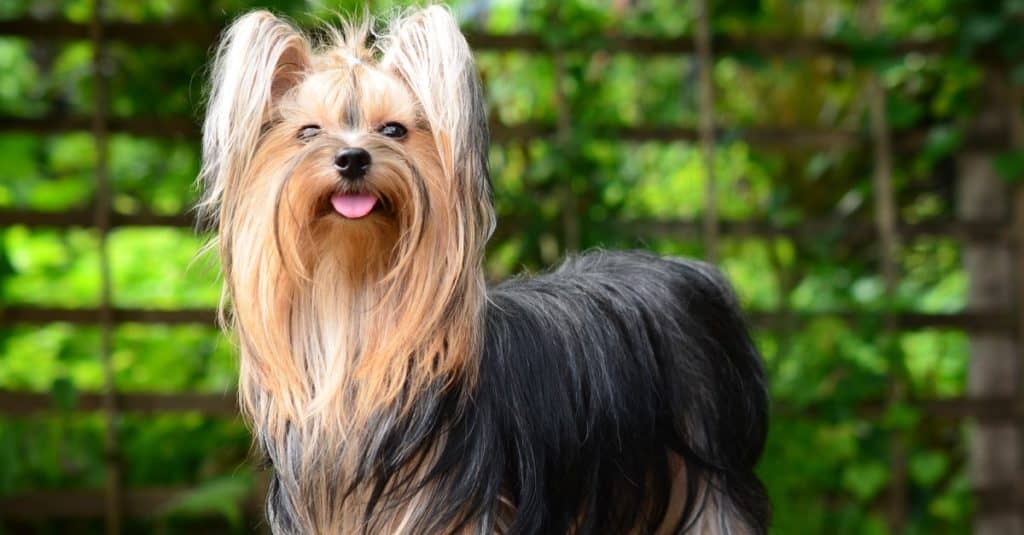
Male and female Yorkshire terriers are generally capable of growing to the same maximum weight
©Mr. SUTTIPON YAKHAM/Shutterstock.com
Yorkies tend to be inconsistent when it comes to size. For puppies, a single litter can have one pup weighing four pounds while another weighs up to six pounds. And, usually, one of those puppies will become a 15-pound adult.
On average, these mini pooches will be eight to nine inches to the shoulder. They will weigh no more than seven pounds with four to six pounds considered the best weight.
| Height (Male) | 8 to 9 inches |
| Height (Female) | 8 to 9 inches |
| Weight (Male) | 7 pounds |
| Weight (Female) | 7 pounds |
Common Health Issues
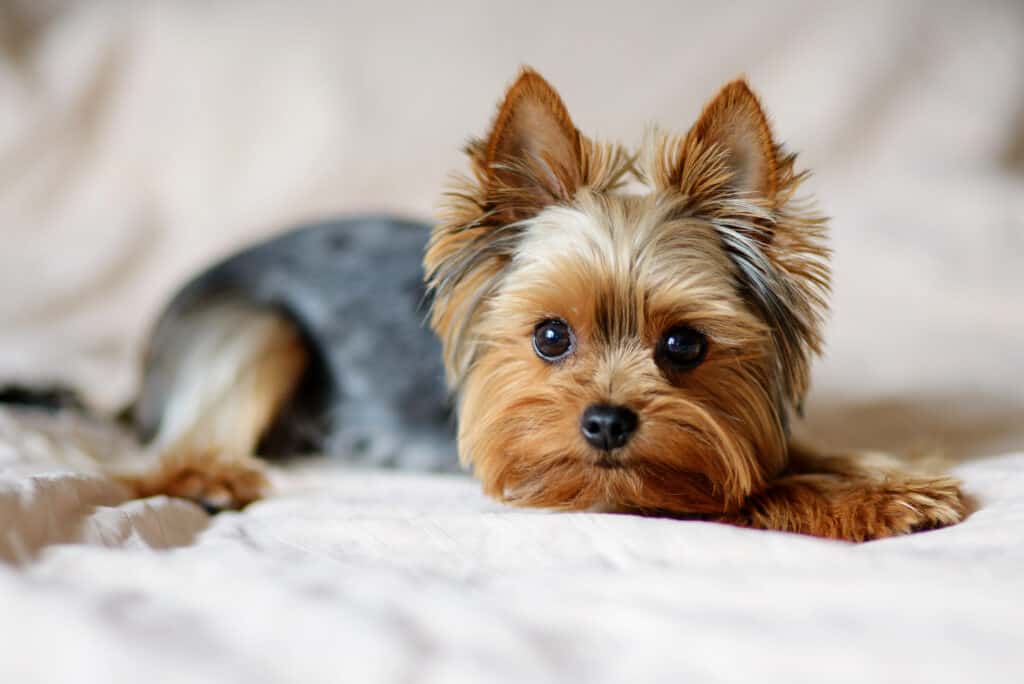
Yorkshire Terriers may experience skin allergies, hypoglycemia, or kneecap dislocation
©Anna Vasiljeva/Shutterstock.com
Yorkies are victims of three types of health issues. These are acquired inherited or congenital diseases. Only a few breed-specific conditions are hereditary. Your mini terrier carries these health risks throughout its lifespan.
You should talk with breeders or vets early to help with quick diagnosis and treatment. Here are health hazards your puppies may fall victim to.
- Hypoglycemia
- Legg-Perthes Disease
- Skin Allergies
- Retinal Dysplasia
- Kneecap Dislocation
Temperament and Behavior
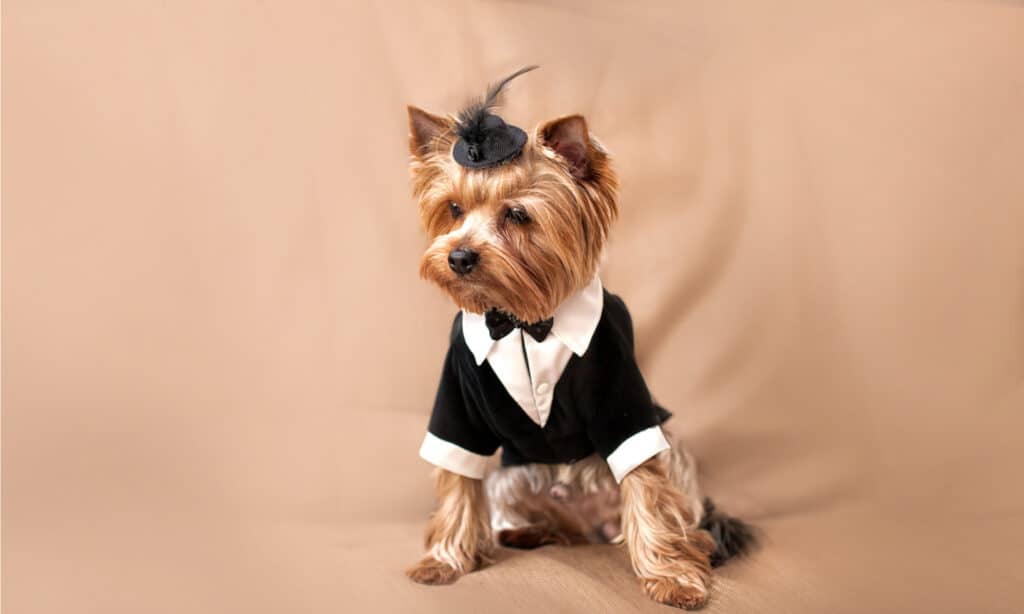
Yorkshire terriers are extremely intelligent and can be aloof and fierce, in spite of a cuddly exterior
©Artsiom Kuchynski/Shutterstock.com
All dogs require early socialization. The Yorkshire Terrier is no different. They need exposure to varying sights, sounds, people, and experiences. Socialization for mini puppies increases the chances they’ll be well-rounded and friendly.
They will be a great companion and friend, but you, the owner, have to set the stage. Yorkies need a leader and limits. Early training, when they are puppies, increases the chances of easily correcting bad habits later.
In the dog world, the Yorkie has a higher-than-average intelligence. This helps make them trainable. They are energetic, communicable, and really, really independent. All these traits make for a varying temperament.
These mini dogs can also be unfriendly and ferocious. But, again, with appropriate training and socialization, you can curtail this behavior.
Care
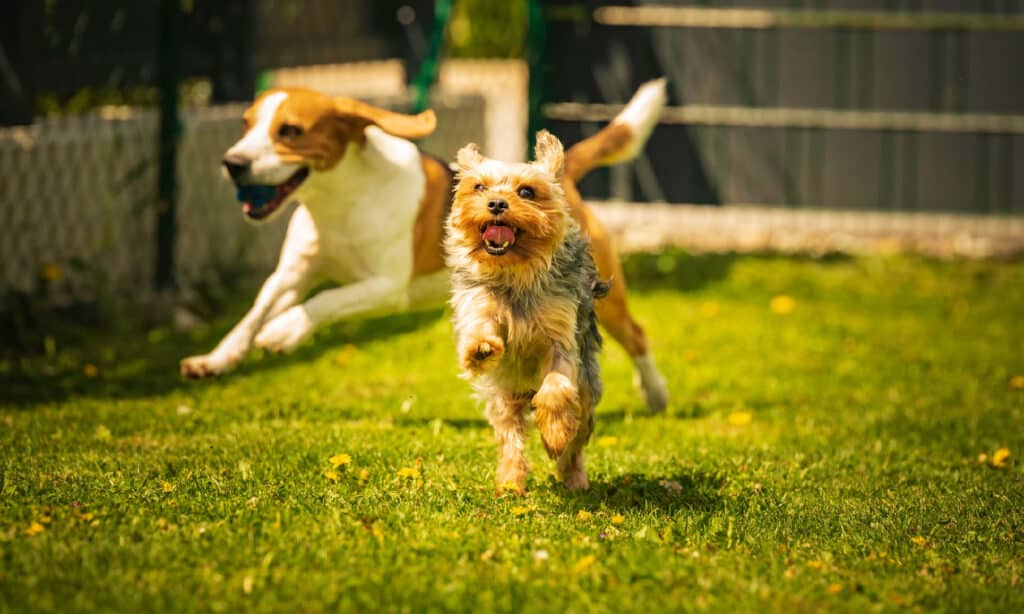
Yorkshire terriers are energetic and will run about all day if you let them
©iStock.com/Przemysław Iciak
Keep up with vet visits as your pooch is a fragile creature. Keep an eye on them if they are particularly small. This could be a sign of some disease or disorder. The pooch has a high energy level and you want to make sure they take a break.
Your poo likes to keep busy and will run all day. That’s why your dog needs a little confined space of their own, perhaps an indoor canine playpen. It allows them to rest or maybe take a nap.
Gated rooms may work for an adult as long as they aren’t too large. Avoid accidents by using pee pads, but don’t rely on them as alternatives to house braking or walks.
The Best Dog Food
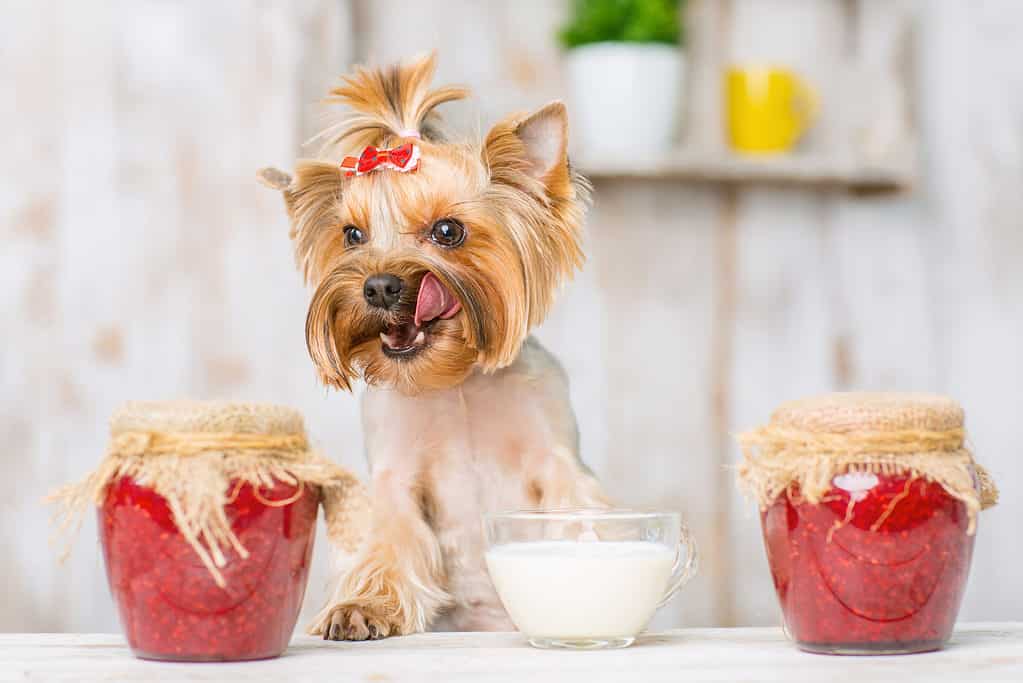
Yorkshire terriers need rich meals before setting off for the day’s training to prevent hypoglycemia
©iStock.com/yacobchuk
You have to take care when feeding a Yorkie. Being mini, they don’t need a lot of food. They also may not be as active as other dogs. Base their meals on size and activity. The moderately active pooch only needs about 150 calories a day. Split feedings into small meals, up to four a day.
To help prevent hypoglycemia, make sure you feed your Yorkshire Terrier a hearty meal at least ninety minutes prior to exercise and activity. Make sure you choose dog food with adequate protein and fat. Due to their long coat length, you should also consider a formula that is high in omega-3 and 6 fatty acids.
At A-Z Animals, we’ve looked into the ingredients of Hill’s Science Diet Adult Formula, and believe it is the best dog food for Yorkies. It has omega-3 and 6 fatty acids (which support the long coat of Yorkies), as well as smaller kibble sizes that make it easier to eat and digest for smaller dogs.
Read more about the best dog food for Yorkies, including our top picks for puppies, adults, and seniors.
Training
Yorkies are inquisitive and smart, so learning is in their nature. They are also independent. Consistent, sensible training and leadership will ensure they behave. If you send them to obedience school, it’s important you take all the instructor’s suggestions to heart. Under a firm, but positive, hand, the Yorkie is a quick learner.
Maintenance and Grooming
- Highly rated and veterinarian-recommended
- Made with highly digestible ingredients
- Includes an antioxidant blend specifically for lifelong immune support
- Contains omega-6 fatty acids and vitamin E
Yorkies need daily brushing to keep their coat soft, silky, and free of mats, tangles, and debris. The trick is to never brush a dry coat. Dry brushing can break a doggy’s fine hair. But you don’t have to bathe them first. Just give your poo a spritz. Use a shine conditioner or plain water. After getting the coat damp, safely brush the dog.
The occasional professional grooming is always recommended. But if you’re doing the haircut at home, talk with your vet, or breeder, or check out a lot of YouTube videos.
While there are plenty of grooming tools, you want the best one for your dog’s haircut. Again, this is a discussion with a pro. They’ll help you decide if your pet needs a double-side comb or a rotating pin comb. And make sure you have a nice haircut kit.
When you do bathe, don’t use a lot of shampoo. Use half the dosage recommended on the product. Double rinse to ensure all shampoo gets washed away.
Brush their teeth every day for a few minutes. With routine, the usually stubborn dog’s resistance will wane. At the least, brush once a week. You can scrape as well, once per month or twice a year.
Exercise
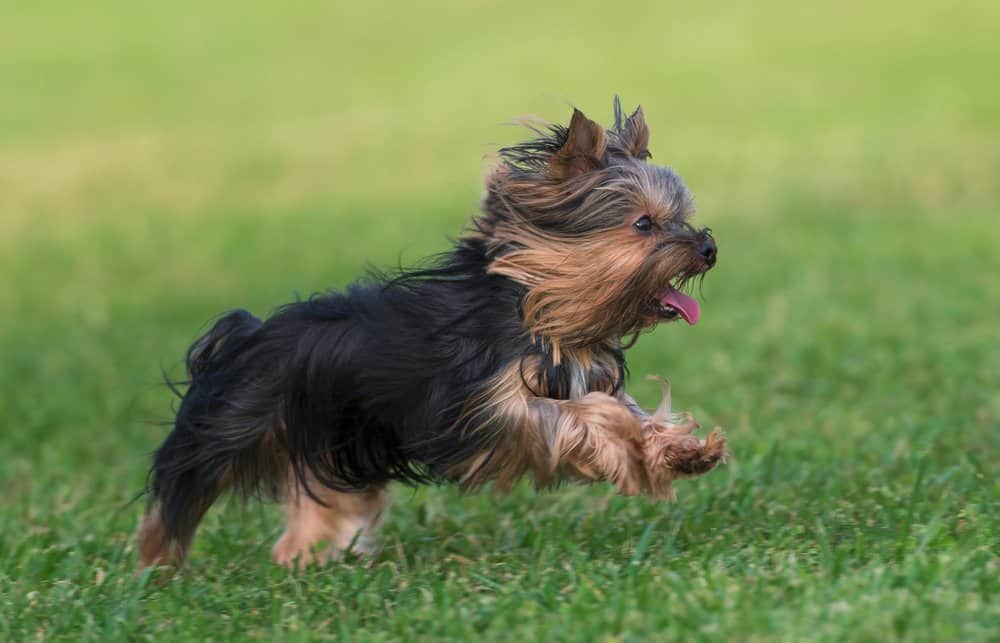
Yorkshire Terriers are energetic and can benefit from an exercise schedule
©tsik/Shutterstock.com
Yorkshires are active, energetic, and love to engage in fun activities. But we as owners must remember these animals are small and fragile. You can’t push them to extremes. Thirty minutes a day is a good length of time. Don’t take them for long runs or bike rides.
Stick to a schedule with your doggy. They are smart and will mentally prepare themselves for going out. They may even be waiting for you so that they can relieve themselves before breaking the rules.
They enjoy fetching, frisbee, and getting the ball or stick. With natural hunting traits, retrieval is a fine sport for the Yorkie.
Puppies
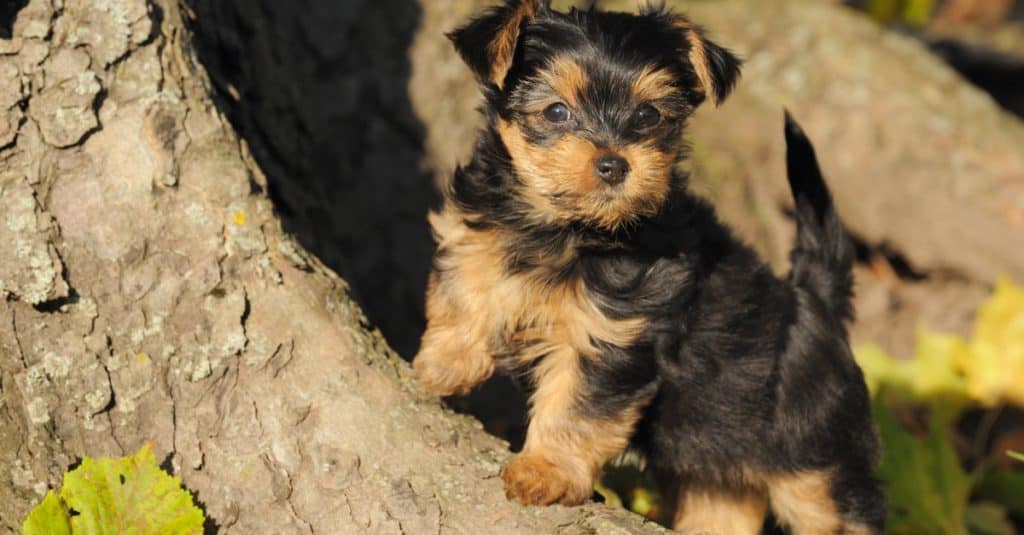
Special care must be taken to provide a firm, but loving hand to Yorkshire terriers
©anetapics/Shutterstock.com
If you’re looking to get a Yorkie puppy, check out breeders, and rescue and shelter operations. Buying one outright may come with a hefty price so give the rescue a chance.
Do your research. You’re getting a friendly, loving, and energetic friend. But you’re also getting a dog that’s going to need your attention and a firm hand. You’ll be responsible for its grooming, its diet, and much more.
Children
Younger children should not spend unmonitored time with a Yorkie. Kids can be overly playful and the frail Yorkie can get flustered. They may snap or growl at children who mean them no harm. It’s important to have concise boundaries for your pet and children’s interactions. Socialization will help a lot, as will training and positive disciplining.
Similar Dogs
Here are three dog breeds like the Yorkshire terrier.
- Yorkillon: A mix of the Yorkie and Papillion created this adorable mini dog. They make for a fantastic companion and don’t hesitate to let you know something suspicious is going down.
- Havashire: The Havashire is truly teacup-sized. Breeders came up with these puppies through a mix of the Havanese and the Yorkie. They bond with family and are extremely protective. But, without proper socialization, you’re looking at a dog that may be quite yappy around your visitors.
- Maltese: This white mini dog is a cross of a Yorkie and a Morkie. This pooch is also known as a Maltiork, Malkie, Yortese, and Yorkiemalt. They have beautiful white coats and steal hearts wherever they are seen.
Popular Names
Here are some popular and great names for a Yorkshire pup.
- Alfie
- Oscar
- Bailey
- Bella
- Lola
Famous Yorkshire Terrier
The most famous Yorkie may be Smoky. A rescue during WWII, Smoky saved American lives. She dragged a communications cable across a 60-foot-long culvert, allowing troops to keep an open line. The doggy visited wounded soldiers in hospitals, possibly making Smoky the first therapy dog. The book Yorkie Doodle Dandy is about Smoky. A half-dozen memorials honor her. One’s at the AKC’s Museum of the Dog.
Other famous Yorkies include:
- A Yorkie lived in the White House during the Nixon administration.
- Tiny Pinocchio appeared on The Today Show and Oprah.
- On the reality TV show, Being Bobby Brown, Whitney Houston had a Yorkie named Doogie.
Yorkshire Terrier FAQs (Frequently Asked Questions)
Is a Yorkshire Terrier a good family dog?
As long as owners are willing to spend a lot of time with their pets and don’t have kids under 10 years of age, then the Yorkie can be a fantastic choice for a family.
Do Yorkshire terriers bark a lot?
Frequent and excessive barking is one of the biggest complaints that Yorkshire terrier owners have about their beloved pets. While being vocal and alert is great for increasing home security, owners should consider desensitization training for doorbells and other common triggers.
How big does a Yorkshire Terrier get?
Yorkies are one of the smallest dog breeds available. Adults are generally only 7 to 8 inches tall at the shoulders and weigh between 3 and 7 pounds.
What Kingdom do Yorkshire Terriers belong to?
Yorkshire Terriers belong to the Kingdom Animalia.
What class do Yorkshire Terriers belong to?
Yorkshire Terriers belong to the class Mammalia.
What phylum to Yorkshire Terriers belong to?
Yorkshire Terriers belong to the phylum Chordata.
What family do Yorkshire Terriers belong to?
Yorkshire Terriers belong to the family Canidae.
What order do Yorkshire Terriers belong to?
Yorkshire Terriers belong to the order Carnivora.
What genus do Yorkshire Terriers belong to?
Yorkshire Terriers belong to the genus Canis.
What type of covering do Yorkshire Terriers have?
Yorkshire Terriers are covered in hair.
What is an interesting fact about Yorkshire Terriers?
Yorkshire Terriers are highly energetic and eager for adventure!
What is the scientific name for the Yorkshire Terrier?
The scientific name for the Yorkshire Terrier is Canis lupus.
What is a Yorkie?
The Yorkshire Terrier is a favorite for companionship. They’re a top choice to mix with other dogs as breeders want the ideal lapdog.
How much does the Yorkie cost to own?
Yorkshire terrier puppies will cost between $600 and $2,500. The average price is $1,200. First-year expenses will hit around $3,855. After, you’ll be spending $1,230 annually. Throughout the doggy’s lifespan, owning the Yorkie price will run around $18,615.
Is the Yorkie good with kids?
Yes, if they’ve had the proper training and socializing.
How long does the Yorkie live?
Yorkies have a lifespan of 13 to 16 years.
Do Yorkies shed?
No. These safe dogs won’t impact your air quality.
What are Yorkies known for?
They are hunters, loving, and are extremely popular with breeders looking to create a new lapdog.
What problems do Yorkies have?
Yorkies can be resistant to training and are easily spoiled, which can make them difficult to deal with.
What's the difference between Yorkies and Shih Tzus?
The main difference between Shih Tzus and Yorkies is their coat types and colors. Shih Tzus are also less mischievous compared to Yorkies.
What were Yorkies bred for?
Yorkies original role was to hunt rats in mines and factories.
What are the differences between the Biewer Terrier and the Yorkie?
The major differences between the Biewer Terrier and the Yorkie are seen in their size and appearance.
What's the difference between a Yorkie and a Morkie?
The key difference between a Yokie and a Morkie is that the Morkie is a crossbreed of a Maltese and Yorkie. Morkies tend to be a bit larger and can be more overprotective of their owners.
Thank you for reading! Have some feedback for us? Contact the AZ Animals editorial team.
Sources
- American Kennel Club, Available here: https://www.akc.org/dog-breeds/yorkshire-terrier/
- Yorkie Info Centre, Available here: http://www.yorkieinfocenter.com/yorkie-puppy-care
- Wag Walking, Available here: https://wagwalking.com/daily/fun-facts-may-not-know-yorkshire-terriers
- Your Pure Bred Puppy, Available here: https://www.yourpurebredpuppy.com/reviews/yorkshireterriers.html#pros-cons
- Borrow My Doggy, Available here: https://www.borrowmydoggy.com/doggypedia/guide-to-dog-breeds/yorkshire-terrier-information-guide#:~:text=How%20much%20exercise%20does%20a,ensure%20a%20happy%2C%20healthy%20pup.
- The Nest, Available here: https://pets.thenest.com/yorkies-aggression-toward-cats-6691.html
- Dog Time, Available here: https://dogtime.com/dog-breeds/yorkshire-terrier#/slide/1
- Yorkshire Terrier Guide, Available here: http://yorkshireterrierguide.com/common-health-problems-yorkies/
- Yorkie Info Center, Available here: http://www.yorkieinfocenter.com/yorkie-temperament-behavior
- Yorkie Advice, Available here: https://yorkieadvice.com/yorkie-temperament/
- Animal Wised, Available here: https://www.animalwised.com/caring-for-a-yorkshire-terrier-things-you-should-know-253.html
- Pets World, Available here: https://www.petsworld.in/blog/how-to-take-care-of-a-yorkie-puppy.html
- Trudog, Available here: https://trudog.com/ultimate-guide-caring-yorkie/
- The Happy Puppy Site, Available here: https://thehappypuppysite.com/yorkie-grooming/
- Family Pet Planet, Available here: https://familypetplanet.com/how-to-meet-a-yorkies-exercise-requirements/
- Rover, Available here: https://www.rover.com/blog/yorkshire-terrier-puppies-everything-you-need-to-know/

